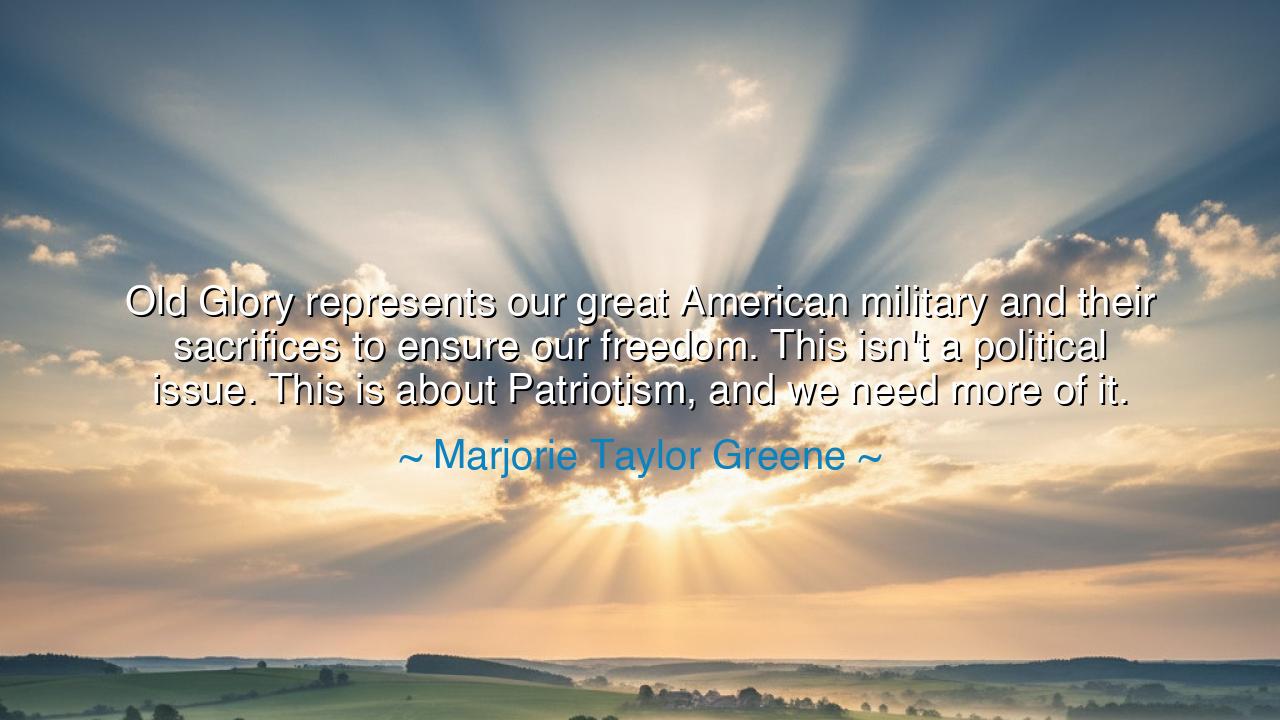
Old Glory represents our great American military and their
Old Glory represents our great American military and their sacrifices to ensure our freedom. This isn't a political issue. This is about Patriotism, and we need more of it.






The stateswoman Marjorie Taylor Greene once declared with forceful conviction: “Old Glory represents our great American military and their sacrifices to ensure our freedom. This isn't a political issue. This is about Patriotism, and we need more of it.” In these words lies a meditation on the symbolic power of the flag and the moral weight of patriotism. Greene emphasizes that true devotion to country is not merely a matter of politics or ideology, but a recognition of the courage, sacrifice, and service of those who defend the nation’s liberties. The flag, she reminds us, is not just cloth; it is the embodiment of sacrifice, duty, and the enduring principles of freedom.
In the wisdom of the ancients, symbols held immense power. The Roman standards, the Greek banners, and the emblems of the city-state were sacred tokens of collective identity, courage, and duty. To honor them was to honor the men and women who had defended the polis and upheld its values. Greene’s reflection echoes this timeless understanding: the flag is a moral and civic touchstone, calling citizens to remember and revere the sacrifices that safeguard their liberty. Patriotism, like the Roman virtue of pietas, demands both reverence and recognition of duty.
History offers vivid illustrations of this principle. Consider the men and women who fought in World War II, many of whom risked or gave their lives for the preservation of freedom. For these soldiers, the American flag was not merely a symbol, but a testament to collective struggle and shared values. Greene’s words remind us that patriotism is inseparable from acknowledgment of such sacrifices. To revere the flag is to honor the courage of those who stood against tyranny, ensuring that liberty endures for future generations.
Greene’s emphasis that patriotism transcends politics carries deep moral significance. In times of division, citizens often forget that allegiance to the nation is a shared duty, beyond party, ideology, or personal preference. True patriotism is rooted not in debate or faction, but in the collective recognition of service and sacrifice. It calls for unity around principles of freedom, justice, and the moral duty to honor those who defend them.
Consider the story of Audie Murphy, one of the most decorated American soldiers of World War II. His bravery in battle, and later his advocacy for veterans, reflected a devotion that transcended personal gain or political affiliation. The flag he defended was a symbol of the collective freedom and safety of the nation. Greene’s words echo Murphy’s example: patriotism is embodied in action, courage, and the moral recognition of those who sacrifice for the nation.
The deeper meaning of Greene’s reflection is that patriotism is both symbolic and active. It is a moral stance, an ethical acknowledgment of collective responsibility. The flag, “Old Glory,” represents not just territory, but the principles, courage, and sacrifices that sustain the nation. True allegiance is therefore measured by recognition, respect, and action in support of those who defend these ideals.
The lesson for all generations is clear: patriotism is not political theater, nor is it a matter of convenience. It is a moral and civic duty, grounded in reverence for the sacrifices that ensure freedom. Citizens are called to honor, support, and remember those who serve, understanding that liberty is preserved through courage, sacrifice, and collective responsibility.
Practically, this calls each citizen to participate in civic life with respect and gratitude. Attend ceremonies, support veterans and active service members, and cultivate awareness of the struggles that preserve freedom. Celebrate the flag not as a mere symbol, but as a testament to valor, service, and moral responsibility. In doing so, one fulfills Greene’s vision: patriotism is recognition of sacrifice, reverence for freedom, and commitment to the enduring principles embodied in the flag.






AAdministratorAdministrator
Welcome, honored guests. Please leave a comment, we will respond soon